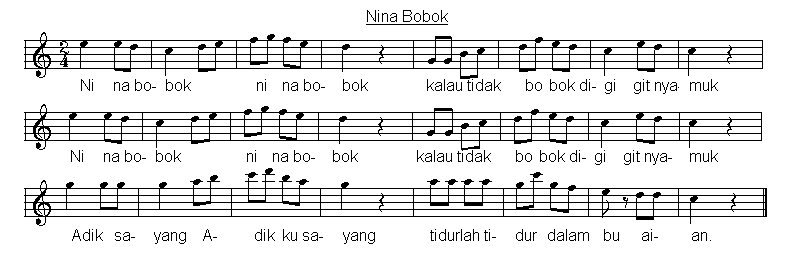Nina Bobo
"'Bobo' or 'bobok' is children's language for 'to sleep'." -Willem
Nina is a child's name.
Nina Bobo
Lullaby
Lullaby
Lullaby
(Bahasa Indonesia)
(English)
Nina bobo,
oh, nina bobo,
kalau tidak bobo,
digigit nyamuk.
Adik sayang,
adikku sayang
tidurlah tidur
dalam buaian.
Lullaby
Oh, lullaby
If you are not sleeping
The mosquito will bite you.
Dear brother/sister
My dear brother/sister
Sleep oh, sleep
In the cradle.
Notes
Innosanto Nagara wrote:
"I looked on your site, and here is a better translation for that version. 'Nina bobo' translates as 'go to sleep, nina' (Nina is a child's name). 'Nina bobo' might be translated by some as 'lullaby' only because it's THE quintessential lullaby in Indonesia so you can use the word as a verb, as in to 'ninabobok' your child meaning to sing them to sleep.
Buaian at the end is also complicated, because it can be used to mean something like 'lull' (as in lull to sleep). But it comes from the concept of a swing or cradle for babies so 'dalam buaian' does connote the atmosphere of being lulled to sleep as much as the physical cradle, so 'in the cradle is maybe too literal'. But 'lullaby' is not a correct translation.
Go to sleep, Nina
oh, go to sleep Nina
If you don't sleep
the mosquito will bite
Beloved sibling,
my beloved sibling
sleep, go to sleep
in the cradle
Hope that helps!
Inno"
Comments
Nina Bobok is another version of this lullaby. Willem G. Maassen wrote: "During the times that I lived in Indonesia we have learned a different song text. This does not mean that one lyric is better than the other: it's often a question of local custom. 'Bobo' or 'bobok' is children's language for 'to sleep'. In adult Indonesian language it is 'tidur'."

Thanks and Acknowledgements
Many thanks to Tri Arini for contributing the first verse of this lullaby.
Many thanks to Agustina Arie Wardhani for contributing the second verse and for translating this song. Agustina wrote, "I think this song is used to lullaby a baby and the word 'nina bobo' is referring to 'lullaby'."
Many thanks also to Willem G. Maassen for commenting on this song, to Monique Palomares for the midi music and to Harri Saptadi from Central Java Province in Indonesia for the sheet music.
Thanks to Innosanto Nagara for the 2nd translation.
Terima kasih banyak!


























